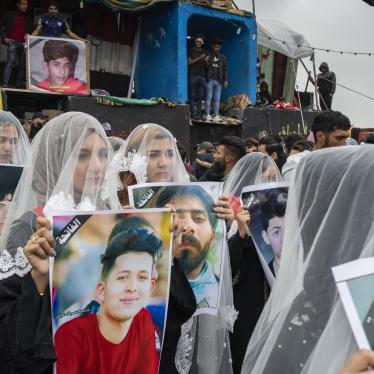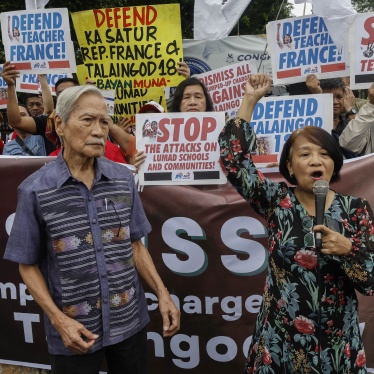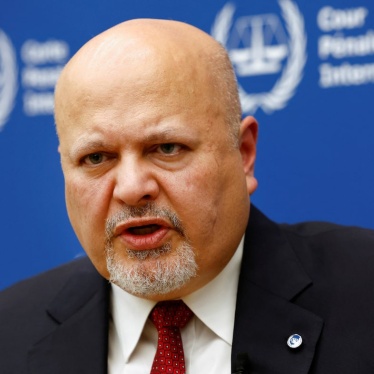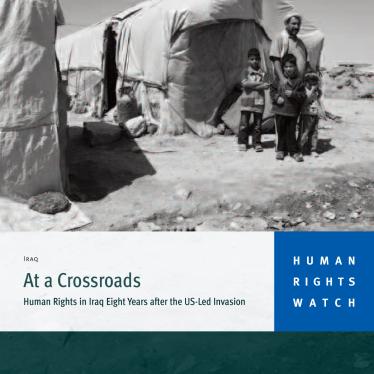(Beirut) – Saudi reform advocates have staged several protests since mid-December, 2011, despite a categorical ban on protests issued last March, Human Rights Watch said today. In Riyadh, Buraida, and Qatif, security forces immediately arrested the protesters, who were peacefully protesting the detention without trial of hundreds of people held for long periods in intelligence prisons.
Saudi Arabia’s Interior Ministry should immediately release scores of detained and convicted peaceful advocates of reform, Human Rights Watch said.
“Saudi Arabia is not immune to the Arab Spring,” said Christoph Wilcke, senior Middle East researcher at Human Rights Watch. “The basic human right to protest peacefully is all the more important in a place like Saudi Arabia, where there are almost no other means of participating in public affairs.”
Since the Arab protest movements began in January, hundreds of Saudis have voiced specific grievances or called for political reform. The Saudi government banned all public protests on March 5, after public protests in the capital, Riyadh, and in Qatif in the Eastern Province. However, the Qatif protests have continued and Riyadh protests began again in mid-December.
On December 23, Saudi security forces arrested about 30 women and 30 men who participated in a silent protest in Riyadh, a participant told Human Rights Watch. The protesters called in particular for the release of Dr. Yusuf al-Ahmad, a controversial cleric arrested in July after he tweeted support for the relatives of long-term detainees. By December 28, all but four or five of those arrested had been released.
On December 16, more than 100 women and several dozen men demonstrated in Riyadh and in Buraida, capital of Qasim Province north of Riyadh, calling for long-term detainees to be released or brought to trial. In Riyadh, security forces arrested about 34 men and several women from al-Rajhi mosque after one man shouted “Freedom for the detainees,” a participant told Human Rights Watch. Security forces also briefly detained dozens at Buraida’s al-Rajhi mosque. Most of the women and at least 13 men arrested in Riyadh were released by December 23. Several men remain in detention, activists told Human Rights Watch.
Between November 20 and 23, security forces shot dead four people who were participating in demonstrations in Qatif and al-‘Awwamiyya. The circumstances are unclear, but on at least one past occasion the security forces have used unnecessary lethal force against protesters, in violation of international law. The government announced an investigation on November 24, but no details have been made public.
The Interior Ministry’s March 5 statement prohibiting public protest stated that “The kingdom categorically prohibits all forms of demonstrations, marches, or protests, and calls for them, because that contradicts the principles of the Islamic Sharia, the values and traditions of Saudi society, and results in disturbing public order and harming public and private interests.” The next day, the Council of Senior Religious Scholars, the highest body for interpretation of Islamic law, endorsed this position.
Because Saudi Arabia has no written criminal law, defining the offenses of participating in or calling for a public protest is within the discretion of the judge, who also decides what, if any, punishment should apply.
Saudi Arabia is a state party to the Arab Charter on Human Rights, which states in article 24 that “every citizen has the right… to freely pursue a political activity [and] to freedom of association and peaceful assembly.”
On December 14, a group of political reformers best known for their activism in 2003 and 2004 released a statement, “Twenty Recommendations for Doubling the Success of Demonstrations.” The document offers practical advice about organizing and says that, “demonstrations are among the most powerful means of holy struggle,” which the authors said in the document is aimed at reforming the monarchy, not toppling it.
On December 12, more than 100 women who are relatives of long-term detainees had signed a declaration stating that, “After today, no prison can terrorize us and no false religious rulings deter us.” One activist told Human Rights Watch that the authorities have not arrested the authors or signers of these statements “because it is so public they think the price is too high.”
Saudi courts are currently trying three activists who were peacefully participating in or calling for demonstrations. In July, a court sentenced five protesters to one year in prison merely for participating in a demonstration.
In November, Egypt’s al-Azhar, one of Sunni Islam’s most renowned institutions of learning and interpretation, addressing the issue of peaceful demonstrations, said that: “Peaceful national opposition movements are truly among human rights in Islam that all international treaties have affirmed, and they are the duty of citizens for reforming their society and strengthening their rulers, who, together with all those in power, are obliged to respond to them without inconsistency or intransigence.”
In addition to the kingdom’s ban on public protest, the government routinely represses expression critical of the government. The three activists currently on trial also face charges of distorting the reputation of the kingdom abroad and causing divisions among people, people familiar with the trials told Human Rights Watch. In January, the kingdom issued a law subjecting virtually all online expression to the kingdom’s restrictive Press and Publications Law, and in April it tightened that law further to criminalize, among other things, harming “the reputation [or] dignity” of religious officials.
The Ministry of Culture and Information holds tribunals for violations of the Press and Publication Law. In September, this ministry announced an investigation into a local newspaper for writing about a court sentencing a woman to 10 strokes of the cane for driving a car. The ministry charged the paper with “causing chitchat among citizens.” In October, the minister of higher education sent a secret cable instructing university professors not to criticize government policies.
“In 2011, the Saudi government shed all pretense of reform and become the kingdom of silence,” Wilcke said.
Recent Saudi Government Violations of the Rights to Freedom of Expression and Peaceful Assembly
Lethal force against protesters
Saudi activists in and near Qatif have held regular protests since March. The Qatif protests have in particular called for the release of nine people detained without trial since 1998 on suspicion of involvement in the bombing of a US military facility in nearby al-Khobar, in which 19 people died.
On November 20, Saudi security forces shot dead Nasir al-Muhaishi at a checkpoint in Qatif. During clashes following his funeral procession on November 21, security forces shot Ali al-Filfil to death. A video circulated on the internet by local activists shows the body of a man identified as al-Filfil lying on the side of a street.
On November 23, during angry protests over the deaths of al-Muhaishi and al-Filfil, security forces shot dead two more protesters, Munib Al ‘Adnan, and Ali al-Qarairis. Activists circulated an edited video on the internet purporting to show the moment in which Al ‘Adnan and al-Qarairis were shot. The video depicts a group of about 30 people standing on one side of a busy street at night, with two security force vehicles the size of small trucks on the other side of the street, not more than 30 meters away, with their front lights on and one vehicle’s emergency lights flashing. The group does not appear to be engaging in hostile actions against the security vehicles or carrying arms. Then single shots ring out, and some people in the crowd hurriedly carry a body away while others follow.
Another video, which a local activist sent privately to Human Rights Watch, purports to show Al ‘Adnan’s head with a bullet wound that allegedly killed him. His death certificate notes “gunshot” as cause of death, without giving further details.
The Associated Press, on November 24, reported that the Interior Ministry had said that “unknown criminals” who “fired on security checkpoints and vehicles from houses and alleyways” were responsible for the deaths.
Activists told Human Rights Watch that nine people have been wounded by gunfire since October, mostly in Qatif or Shia towns in the province. One told Human Rights Watch that he was shot from behind as he walked past the local police station. A medical report stated that a bullet had entered him from the side. Human Rights Watch is withholding further information to avoid identifying the person.
The nine people injured are: Abdullah Muhammad Abu Abdullah, 22, shot on October 13, Ali Ja’far al-Alwan, 17, Salih Mahdi al-Marar, 13, Mamduh Ja’far al-‘Ulwan, 20, and Muhsin Ali Al Mughais, 21, all shot on October 16; Husain Salman al-Nazhar, 24, shot on October 18; Muhammad Abd al-Wahid Al ‘Abbas, 20, shot on October 26; Muhammad Fu’ad al-Banawi, 23, shot on November 10; and Ahmad al-‘Aradi, 19, shot on November 22. There are few reliable details available concerning the circumstances of the shootings.
Arbitrary Detention
Security forces have arrested hundreds of protesters since March, most in the Qatif area. The latest releases, of seven protesters, were on December 27, but others remain in detention, including Fadhil al-Manasif, a local human rights activist. Police arrested him on October 2 as he tried to keep them from arresting two elderly men whose sons were wanted for participating in a demonstration. Al-Manasif remains in the intelligence prison, but Human Rights Watch has found no evidence that charges have been brought against him.
In late February, Muhammad al-Wadh’ani, in an internet video posted in late February, called for peaceful public protests to bring down the absolute monarchy of the Sa’ud family and for the release of political prisoners. Men in civilian clothes arrested him during a small protest in Riyadh on March 4. An activist said he was taken to a hospital soon after his arrest. Relatives who have since seen him said his body appeared to bear signs of torture. It is not known if he faces any charges.
Charges for Exercising Basic Rights
While many protesters have been detained without charges, prosecutors have pressed charges and courts have heard cases against other peaceful protesters and reform advocates.
In March, security forces arrested the human rights activist Muhammad al-Bajadi; Dr. Mubarak Zu’air, a lawyer for the families of long-term detainees; and two lone protesters, Muhammad al-Wad’ani and Khalid al-Juhani, for engaging in peaceful public protests. All four remain in detention.
Al-Wad’ani was arrested on March 4. Intelligence agents arrested al-Juhani, a teacher who was the sole protester on a public square in Riyadh on March 11, the day activists posting on Facebook had declared to be Saudi Day of Anger. Speaking to some international journalists gathered there, al-Juhani gave an interview to the BBC calling for freedom of expression and democracy. After spending months incommunicado in the intelligence prison, he faces charges of participating in a public demonstration and speaking to foreign media.
In July, a Riyadh court sentenced five protesters who had peacefully demanded the release or trial of their long-term detained relatives to a year in prison for “encumbering the affairs of the ruler,” and “disobeying” the ruler by demonstrating and causing chaos.
Judges of the Specialized Criminal Court, established in 2008 for terrorism suspects, are trying Zu’air on similar charges: encumbering the affairs of the ruler, not complying with rules and regulations, attending an unlicensed gathering, spreading sedition, and not obeying religious scholars. His first court hearing was on December 22, over nine months after his arrest. Zu’air had no notice of the trial, he told Human Rights Watch, and so his lawyers could not attend.
He related the details of his arrest to Human Rights Watch: On March 13, he led several hundred relatives of long-term detainees held by the domestic intelligence service, the mabahith, to the Interior Ministry in Riyadh to seek a meeting with officials.
Zu’air said that a security official called him over and handed him his mobile phone, saying the deputy minister of interior for security affairs, Prince Muhammad bin Nayef, wanted to speak to him. Bin Nayef offered a meeting on March 18, and asked Zu’air to disperse the crowd, which Zu’air said he did. The prince’s office postponed the meeting to March 19. He and the prince discussed the long-term detentions in violation of the kingdom’s laws, Zu’air said. The prince asked Zu’air to convey to the relatives that 800 detainees would be freed soon, while others, some of whom would be released on bail, would face trial. However, police arrested Zu’air on March 20 as he was on his way to the Interior Ministry to convey the prince’s message to the relatives again gathered there.
In a similar case the Specialized Criminal Court in September sentenced Abd al-Aziz al-Wuhaibi, an Islamic scholar, to seven years in prison following his arrest in February together with at least four others who intended to establish the kingdom’s first political party. The court considered this act a criminal offense, lawyers and family members familiar with the case told Human Rights Watch. They added that the court did not allow lawyers for al-Wuhaibi to attend the trial and that he has not yet received the written verdict.
Al-Bajadi was arrested by domestic intelligence agents on March 21 and charged with instigating demonstrations, membership in an unlicensed association, supporting the protests in Bahrain, and possession of prohibited books. Bajadi is a founding member of the Association for Civil and Political Rights (ACPRA), which the government has refused to license. Fellow activists told Human Rights Watch that the books in question came from that year’s international book fair in Riyadh. The judge has not allowed al-Bajadi’s lawyers to attend the trial, the latest session of which took place on December 9.
In May and June, over 50 women defied an informal ban on women driving in the kingdom. In Jeddah, police arrested 34-year-old Shaima al-Jastania as she drove to a hospital on May 19 to receive an injection. On September 27 Judge Abd al-Majid al-Luhaidan of the Summary Court sentenced her to 10 lashes for violating public order. According to the verdict, he based his opinion on the Qur’anic verse obliging believers to obey God, His messenger, and their rulers, and noting that the Interior Ministry had banned driving, although no such law exists in writing in the kingdom. Al-Jastania appealed the verdict.
Human Rights Watch opposes lashing and other forms of corporal punishment as torture and ill-treatment in violation of the Convention against Torture and other Cruel, Inhuman or Degrading Treatment or Punishment, to which Saudi Arabia is party.
Government Gag Orders
When Al-Watan, a Saudi daily newspaper, on September 28 printed news of the 10 lashes imposed on al-Jastaina, the deputy assistant minister of culture and information for domestic media wrote a letter to the paper’s editor announcing an investigation for “encroaching upon the national bond and causing chitchat among citizens.”
On October 22, the higher education minister sent a telegram marked secret to universities complaining about the “plethora of comments… by public employees that reprimand and criticize the policies and programs of the state.” Dr. Fahd al-Harbi, dean of the faculty of dentistry of the University of Dammam, a public institution under the Higher Education Ministry, on November 19 wrote to all teaching staff, technicians, and administrative employees to relay the minister’s message and to instruct them “not to publish, issue, or sign statements or letters that oppose the policy of the state or that contradict the basic laws.”





